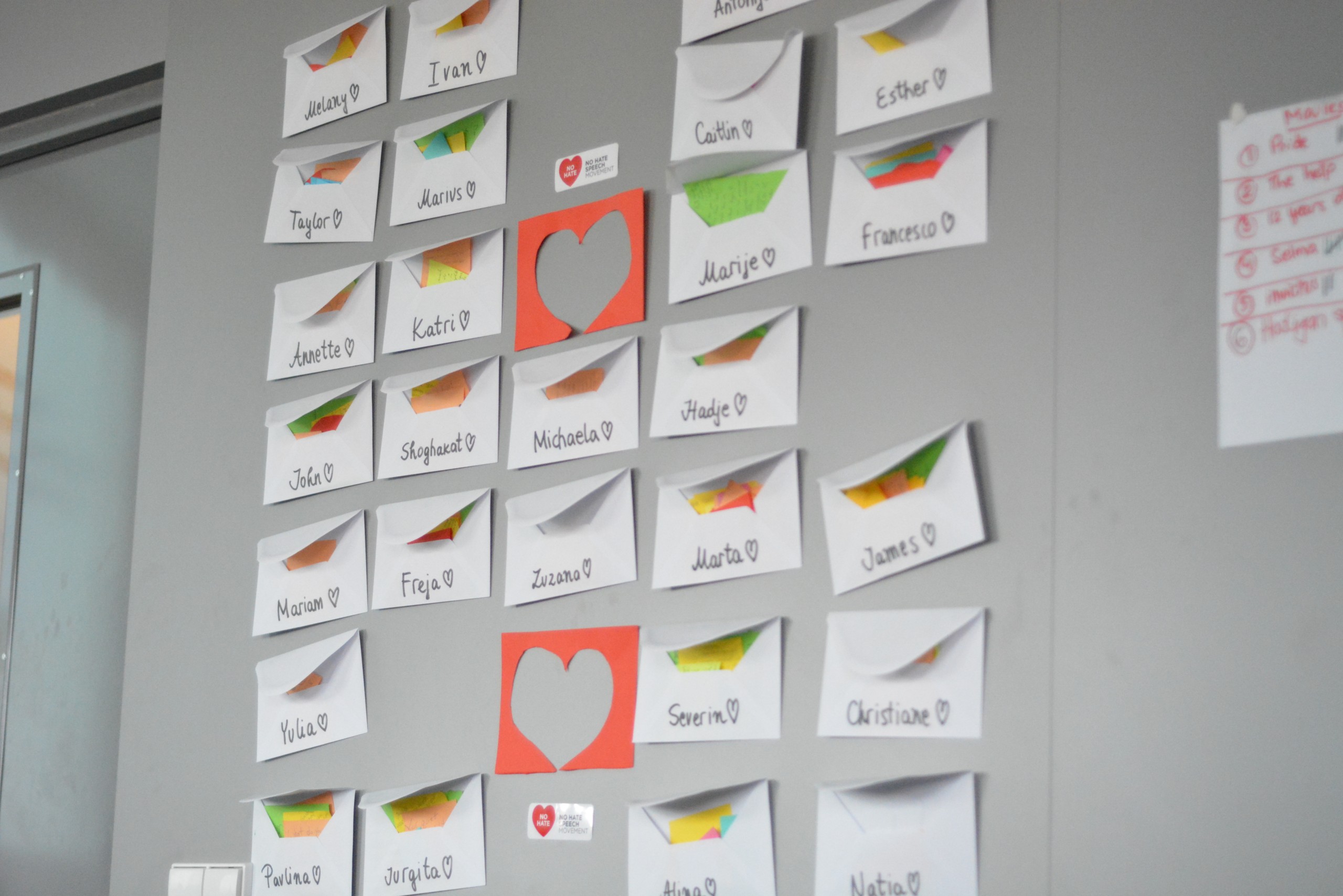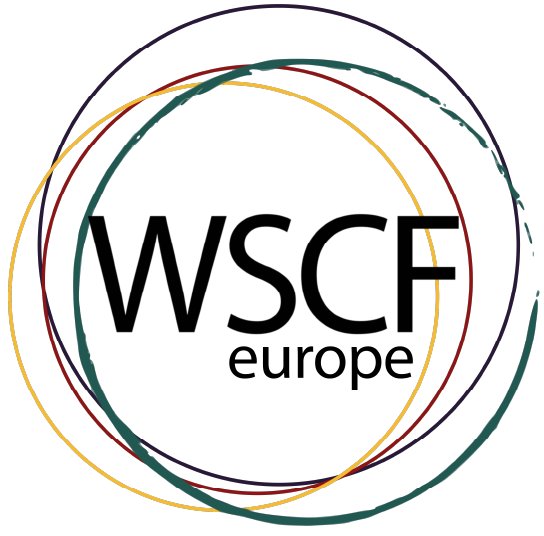Resource Hub

As an organisation that represents Student Christian Movements from across Europe, WSCF-Europe strives to enable young people to become drivers of positive change. Building capacity amongst our movements, through sharing best practices of community work, insights on various topics related to human rights and spirituality and resources that can guide young people in their undertakings, is at the core of WSCF-Europe’s mission and vision.
This Resources Hub is designed for exactly these purposes and is updated regularly. The resources available on this Hub are divided into four themes – Appeals and Solidarity, Theology and Spirituality, Youth Activism and Practical Resources – which match the main pillars of our organisation’s work.
We are always seeking to improve this repository of resources by uploading new, useful materials. If you or your Student Christian Movement have developed and/or used resources that you have found particularly helpful, feel free to share them with us at communications@wscf-europe.org, so that we can upload them on this Hub and share them with others.
Appeals & Solidarity
WSCF-Europe is part of a global federation of youth Christian movements united by their faith and fight for justice and peace. Expressing solidarity with and supporting Christians, and other people, who face persecution, human rights abuses, violence and natural disasters, across the world, is a key feature of the work that we do.
The “Appeals and Solidarity” resources can be used as examples of good practice to inspire other young people and organisations in their work, but also as historical sources, tracking the causes that WSCF-Europe has supported over the years.
Appeals and Calls for Solidarity
Every time young people are faced with, or made aware of, human rights abuses, natural disasters, persecution, and other social, economic, cultural, political or environmental issues, they are encouraged to join their forces, speak up and support one another.
This page brings together all the appeals and calls for solidarity released over the years by WSCF-Europe, WSCF Global, Student Christian Movements, on their own or in partnership with other organisations
Communiques
Every time young people are faced with, or made aware of, human rights abuses, natural disasters, persecution, and other social, economic, cultural, political or environmental issues, they are encouraged to join their forces, speak up and support one another.
This page brings together all the appeals and calls for solidarity released over the years by WSCF-Europe, WSCF Global, Student Christian Movements, on their own or in partnership with other organisations
Theology & Spirituality
WSCF-Europe is an ecumenical organisation that brings together young Christians from across different denominations, as well as young people from other religious backgrounds. We believe that solutions to the world’s most pressing problems can only be found through interfaith and interdenominational dialogue and exchange of ideas. We also want to ensure that young Christians have the right tools at their disposal to deepen their faith through reflection, both through traditional means, but also through new, sometimes more interactive, means, on topics that are of most concern to them.
The worships, prayers and Bible studies on this Resources Hub can be used by young Christians of different denominations, or by those of non-Christian belief who want to explore the Christian religion. Student Christian Movements, and other young people, can use these resources in their activities and can tailor them to their local context.
Worships and Prayers
This page compiles worships and prayers that were developed by members of WSCF-Europe and/or other WSCF regions, by guest speakers or trainers to WSCF events, by Student Christian Movements or by other young people who have been in contact with WSCF-Europe, in a way or another, over the years.
Some of the resources are specific to certain denominations, but most can be used across all denominations. They span a variety of topics, reflections, reasons for prayer and moments of the day, and can be used as they are or adapted to the local context, different topics and audiences.
Bible Studies
Bible studies are one of the methodologies used the most in WSCF-Europe events, as they provide insightful opportunities for reflection on various topics, using texts from the Bible. They can be used as conversation starters or to deepen discussions, for individuals, small or large groups.
This page brings together Bible studies, and other similar materials, that have been used by WSCF-Europe members, Student Christian Movements and other related organisations and individuals, in various contexts. They capture a variety of topics and can be used as they are or adapted to local contexts and different audiences.
Universal Day of Prayer for Students
The Universal Day of Prayer for Students (UDPS) is WSCF’s longest-established ecumenical event. It was first celebrated on 13 February 1898, at the second meeting of what was then known as the General Committee of WSCF. The participants of the Federation’s then ten member movements believed that intercessory prayer should be a vital ingredient in the life of a worldwide body of Christian students. During the World Wars, when it was impossible to hold WSCF meetings, the major bond of unity between those separated from one another by the ravages of war was the annual observance of the Day of Prayer for Students.
Each year, the UDPS is celebrated, usually on the third Sunday of February, through a common liturgy, prepared by one of the six regions of WSCF. The liturgy and materials prepared over the years for the various UDPS celebrations are available on this page, so that Student Christian Movements and other young people can use them in their movements and organisations to learn about and mark this event.
Youth Activism
The work of WSCF-Europe focuses on building awareness of and inspiring action on societal, human rights and ecumenical issues. We want Student Christian Movements and other young people across Europe to feel inspired by their faith and use it to deepen their understanding of other issues that the world is facing. We want them to become promoters of human rights and to have the courage to speak up when they are faced with or witness abuses.
Our Resources Hub brings together tools and materials that can help young people in achieving this. These resources include: toolkits, activities outlines, analysis papers, campaign ideas, advocacy guidance and many others. The resources are divided into four categories – Interfaith Dialogue and Ecumenism, Human Rights, Gender and Sexuality, and Eco-Justice – which match the key areas in which WSCF-Europe has been, and aims to be, most active.
Interfaith Dialogue and Ecumenism:
As an organisation that represents Christian youth, WSCF-Europe encourages young people to use their religion to reflect on various topics, both related to theology and the spiritual aspect of life and to wider societal issues. One of the key aims of WSCF-Europe is to facilitate interfaith and interdenominational dialogue amongst young people in Europe, recognising that solutions to wider societal problems can only be found when people from different backgrounds join their forces together.
This page brings together resources that can be used to facilitate conversations and activities involving young people from different religious backgrounds, denominations, countries and cultures.
Human Rights
WSCF-Europe believes in the power that young people can have when they speak up about human rights abuses and when they come together to design solutions to the most pressing problems in society. As an organisation, we run bespoke advocacy campaigns focused on various topics related to human rights. We are also constantly inspired by the campaigns and activities that our Student Christian Movements deliver in their local communities, and we are always interested in knowing how we can best support such endeavours.
On this page, you can find resources that can be used to run campaigns and activities on various human rights topics, including refugees’ and migrants’ rights, combating youth extremism, fostering diverse and inclusive societies, and many others. These resources can be used to organise activities with your local Student Christian Movement and in your community, or as examples of good practice and ideas to inspire future action.
Gender and Sexuality
Gender identity and sexuality are topics that some Christians have struggled with. WSCF-Europe is keen that young people don’t see their religion as an obstacle, but as a tool that helps them reflect on their beliefs and identity. We think that everyone should strive towards creating inclusive societies that do not accept discrimination in any form, including societies that do not accept discrimination on the basis of gender or sexual preference.
This page contains resources that can help young people start conversations on these two topics, gender identity and sexuality, which can sometimes be difficult to discuss. It offers tools that can be used by individuals and Student Christian Movements to facilitate such discussions and reflect on the intersection between these topics and religion.
Eco-Justice
Caring for God’s creation is one of the duties we have as Christians. This includes caring for our environment and everything that surrounds us. WSCF-Europe’s eco-justice work promotes exactly this message. It seeks to raise awareness of climate change and ecological issues and to encourage young people to take action to tackle some of these problems. This includes developing local solutions or learning from other parts of the world and organisations that are addressing these issues proactively.
This page compiles a variety of resources that can be used to reflect on environmental and eco-justice issues, including toolkits, activities outlines, reflections and others, which were produced by WSCF-Europe, other regions of WSCF, Student Christian Movements and other organisations carrying out work in this field.
Practical Resources
As a global federation, operating in six different regions of the world, the management of WSCF can involve a number of levels, policies and guidelines. Reporting on past, current and future activity, running Assemblies that govern the content and structure of the Federation and each one of its regions, and running safe and useful events for young people across Europe and the world can involve a lot of work.
The ‘practical resources’ provided on our Hub offer a good overview of WSCF and WSCF-Europe – what activities are run, what is being reported on, what policies are in place, what is the financial and human resources situation of each of the organisations. They can be used to build your knowledge about the Federation, or to learn from, using them as guidelines for your own work or to develop similar resources for your movement.
Reports
Every year, or every two years, WSCF-Europe and WSCF release reports that highlight the activity, finances and achievements of the previous period. These reports are all compiled on this page and offer snapshots of the Federation’s progress over the years. The page also contains reports from other WSCF and WSCF-Europe events, gatherings, conferences and others.
Guidance & Policies
As an organisation that prides itself with being present in all six regions of the world, and within that in many countries in Europe and beyond, the management of WSCF can be tricky. Working with young people and ensuring that the events and activities that the Federation provides for them are safe and enjoyable also involves a lot of hard work.
This page brings together guidelines and policies that show how WSCF and WSCF-Europe are run, and how they run their events and conferences in turn. These resources can be used as examples, to develop your own resources for your organisation or movement, as sources of information about the Federation, and as guidelines for your own events and activities.
Global and European Regional Assemblies
Both WSCF and WSCF-Europe are governed by Assemblies of young people that meet every few years to discuss the future of the Federation. They are usually representatives of Student Christian Movements from across the world and from Europe. These Assemblies are a chance to review the Federation’s policies, constitutions and by-laws, and to vote on the leadership structure and team.
This page brings together resources from the various General Assemblies and European Regional Assemblies that have taken place over the years.
